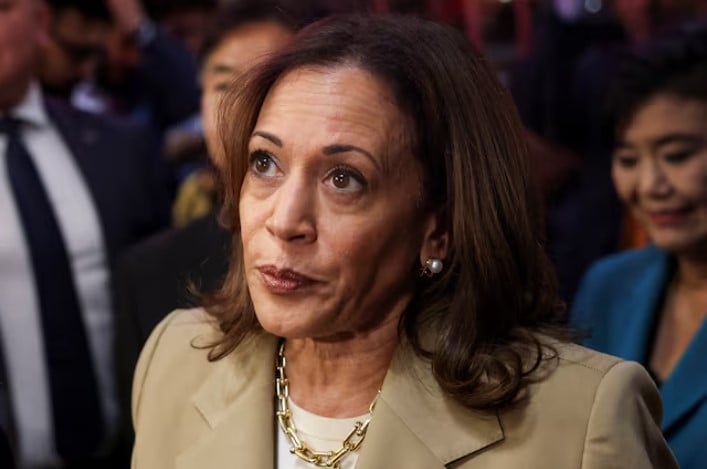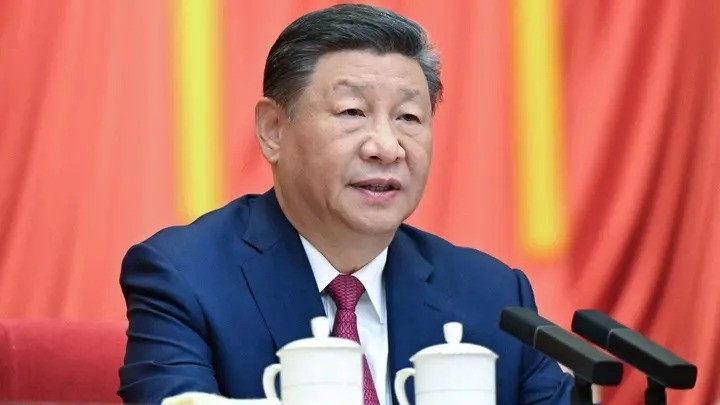A key figure in the U.S. Black business community, who has enjoyed a close relationship with Vice President Kamala Harris, is drawing scrutiny after details emerged about his meetings with Chinese Communist Party (CCP) officials. Ron Busby, long regarded as a trusted Harris ally and praised by the vice president as an “extraordinary leader” and for his “courageous leadership,” engaged in discussions with multiple CCP representatives during a business trip to China. He pledged to spread “the voice of Black businesses” globally.
Busby, who has frequented the Biden-Harris White House and holds the position of president of the U.S. Black Chambers, embarked on the trip in September 2017. The 10-day journey took him and a delegation of New York government officials and business leaders, including then-Gov. Andrew Cuomo’s chief diversity officer Rose Rodriguez, to key Chinese cities such as Beijing, Shanghai, and Xi’an. The group was dubbed the “New Majority Alliance,” and their trip was supported by the Consulate General of the People’s Republic of China in New York, a Chinese government entity that recently faced allegations linked to foreign influence operations.
A High-Stakes Visit to China

The official sponsor of Busby’s trip, the New York in China Center, facilitates business exchanges between New York and China. Founded by John Wang in 2008, the center aims to promote Sino-American cooperation, a mission now under renewed scrutiny. Wang currently serves on the board of Empire State Development, having been appointed by New York Mayor Eric Adams and previously nominated by Gov. Kathy Hochul. During the 2017 trip, Busby documented the experience extensively on social media. He shared photos of meetings with CCP officials, captioning one post, “On the way to China. Spreading the voice of Black businesses around the globe.”
In one image, Busby is seen sitting with other members of the delegation, framed by a large CCP hammer and sickle emblem in the background.
Reflecting on the trip, he stated, The United States, Africa, and China “need each other for the new sustainability.”
At a business conference in Durban later that year, Busby emphasized the significance of collaboration across continents, particularly between China and the African diaspora. “Two weeks ago we were in China and we did a similar memorandum of understanding [MOU] with Chinese Chamber of Commerce,” he noted. According to Busby, “[China understands] the importance of being on the continent obviously, but they also understand that there needs to be a relationship between the people on the continent, and they understand that African Americans have a natural relationship here, and so we [three] will work together to bring their resources that they have along with the ingenuity, creativity that we have in the United States, to bring that here. Collectively, all three continents can grow, and they’re very excited as well as we are.”
Black Business Interests Abroad

Busby’s commitment to fostering global business opportunities for Black entrepreneurs has been a cornerstone of his leadership at the U.S. Black Chambers. In a 2022 report titled “BLACKprint,” the organization touted its success in providing Black business owners access to international markets, highlighting agreements with business leaders in locations such as Durban, Morocco, and China. These international connections, Busby argues, are essential for Black businesses to thrive in the modern global economy.
As part of the delegation’s China visit, Busby engaged in discussions with senior CCP officials and expressed his willingness to share resources with Xi’an. The report details a meeting where Busby mentioned the reach of the U.S. Black Chambers, which oversees over 100 chapters across the United States, and his eagerness to collaborate with Chinese officials on various initiatives.
Strategic Alliances Raise Concerns
While Busby’s efforts to expand Black business interests globally have earned him accolades within the community, his engagement with CCP officials has not gone unnoticed. Critics point to the U.S. government’s longstanding concerns about Chinese influence campaigns, particularly efforts to co-opt local leaders to promote Beijing’s global agenda. A 2020 statement by then-Secretary of State Mike Pompeo described the People’s Association for Friendship with Foreign Countries, with whom Busby met, as a tool for advancing the Chinese Communist Party’s interests abroad.
Busby’s interactions with Chinese officials have raised eyebrows not just in the business community but also in political circles, as Harris faces her own controversies over connections with individuals tied to China. In 2020, an intelligence report from the Director of National Intelligence (DNI) flagged concerns about foreign influence operations originating from Chinese consulates, including the New York consulate that sponsored Busby’s trip.
Black Business Expansion Under Scrutiny
While Busby’s leadership has been lauded by Harris, who recently hosted an exclusive reception at her private residence to celebrate the achievements of Black business leaders, some are questioning the implications of his close ties with China. “hosted an exclusive reception at her private residence” in July of this year to honor Black business leaders, according to a press release. The reception was in partnership with U.S. Black Chambers, Inc and featured Busby, who said the reception was a “powerful acknowledgment of the remarkable progress Black business leaders have achieved in shaping our nation’s economic landscape,” Busby said in a statement following the event. He and Harris have worked closely on numerous initiatives, with the vice president even referring to Busby as her “Oakland brother” during a 2021 event.
However, as more details about Busby’s interactions with CCP officials surface, critics are questioning whether these global alliances could complicate the U.S. Black business agenda. Busby’s participation in meetings with CCP officials, such as Li Yuan, Vice Mayor of Xi’an, and representatives of the Xi’an Provincial People’s Government, underscores the complex dynamics at play.
As scrutiny mounts, it remains to be seen how Busby and his organization will navigate the challenges posed by these global ties, particularly as Harris’s own campaign faces mounting pressure over her connections to figures with long-standing ties to China.
Harris’s Ties to Controversial Delegations
Busby’s ties to China come at a challenging time for Harris, as her campaign grapples with the decision to choose Minnesota Gov. Tim Walz as a running mate. Walz’s connections to China, dating back decades, have caused unease within her ranks.
The question remains whether Busby’s global partnerships, while intended to uplift Black businesses, could draw further scrutiny and potentially hinder the broader Black business movement in the United States.



